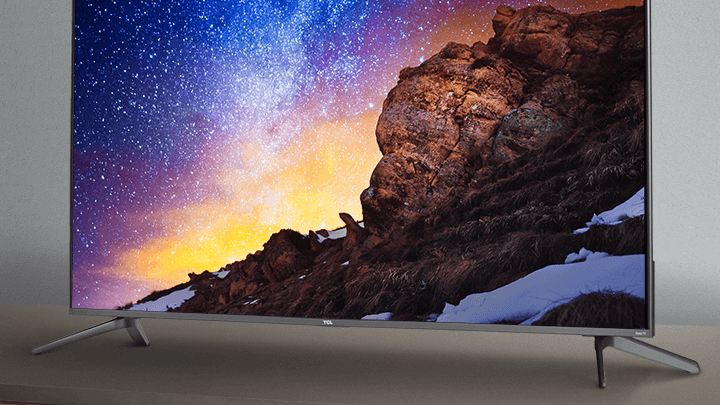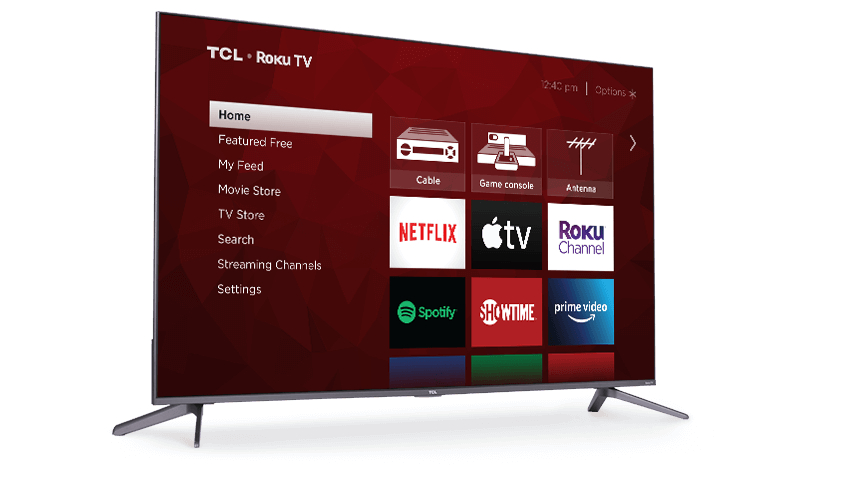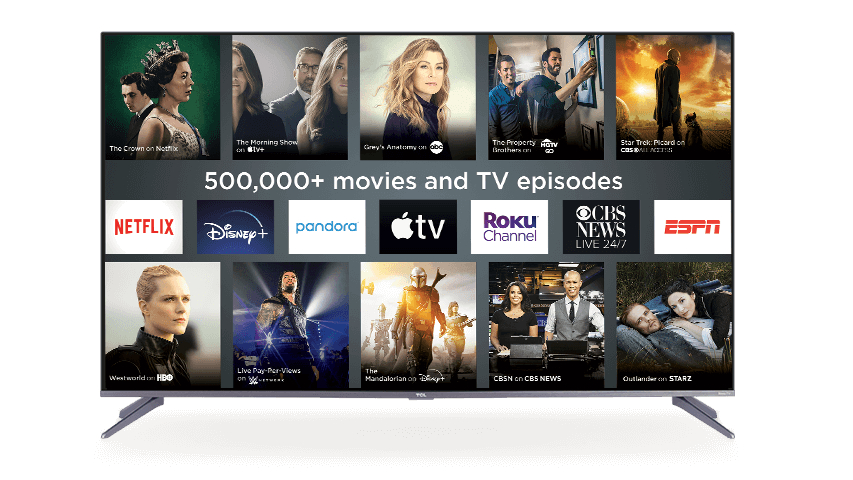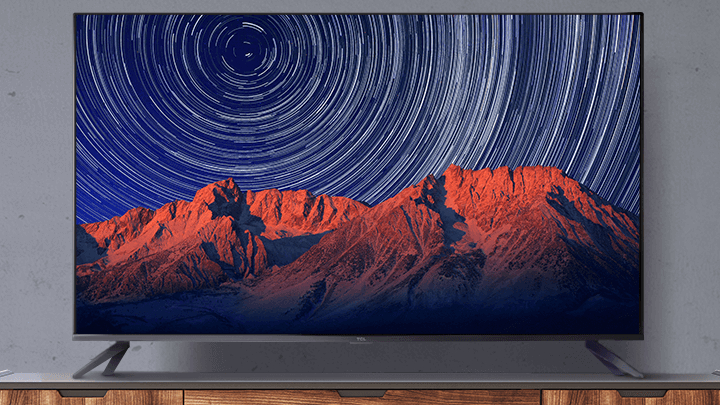TCL 5-Series 2020 QLED TV
One-minute review
The TCL 5-Series (S535) is a prime example of high-end technology trickling down from more expensive models to budget sets. In this case, that technology is QLED – quantum dots – borrowed from last year’s excellent TCL 6-Series (R625) now applied to the 5-Series, too.
If this is your first time hearing about quantum dots, they act like a filter between the LEDs and the screen to amplify color saturation. This improves overall contrast and vibrancy, especially when combined with a full array local dimming system.
To that end, the new TCL 5-Series is among the cheapest QLED TVs on the market, costing significantly less than Samsung’s entry-level QLED, while retaining the expanded color gamut and premium look fitting of a high-end TV. With full array local dimming for better black levels and Roku TV built-in, the 5-Series has a number of advantages over non-smart LED-LCD TVs, making it a great option for the price.
The 5-Series is far from perfect, though. It has the benefits of quantum dots, sure, but unless you want to keep the TV in its default Vivid picture mode that oversaturates the image, you’ll have to decide between color accuracy and higher peak brightness. If you avoid the latter option, the 5-Series lacks the necessary brightness to really make HDR content shine. This unfortunately makes movies and shows look comparatively dull.
Poor upscaling and some lackluster motion processing also make for a real step down from the spectacular TCL 6-Series (R635), which we'd recommend at slightly higher price tag.
- Check out the best TCL TVs overall
Price and release date
While we have some gripes with its picture performance, it’s hard to be mad about the TCL 5-Series’ price – it starts at just over $400 for the 50-inch version (TCL 50S535) while the largest size, the 75-inch (TCL 75S535), comes in at just under $1,000.
While we have no issues with the price of the TV, the TCL 5-Series does sit rather precariously in the 2020 TCL TV lineup. Arguably, you could make the case to plunk down $250 more to get the significantly better TCL 6-Series R635 that ups the brightness of the screen, or save $100 by switching to the non-Dolby Vision-compatible TCL 4-Series.
Your other option, if you’re attached to this price point, is the spectacular Hisense H8G Quantum. Hisense doesn’t have the same clout or name recognition that TCL has, but the H8G brings many of the same features – minus the built-in Roku TV – and higher brightness of around 600 nits in HDR for around the same price.

Design
The TCL 5-Series (S535) is priced on the lower end of mid-range, but it certainly doesn’t look like it. With a minimal bezel and metallic frame, the 5-Series should look modern and sleek in any living room.
To fit a number of entertainment centers, the 5-Series is available in four sizes: 50 inches, 55 inches, 65 inches and 75 inches. We were sent the 50-inch model for review, but outside of the number of dimming zones, the specs and features remain the same.
This year, TCL has added a minimalist cable management system in the back of the two legs that have been hollowed out that can be used to run HDMI and power cables. Unfortunately, we found that the legs weren’t able to hold all four HDMI cables we had running to the TV, but folks with fewer connections should be able to hide cables without much of an issue.
Speaking of cables, the 5-Series offers one set of legacy RCA inputs and four HDMI ports, all of which are HDMI 2.0b compliant and one being eARC-enabled. That last port allows you to connect an AV receiver or soundbar system and use one remote to control the volume and inputs – a very handy feature if your home entertainment system has multiple components.
Probably the biggest flaw of the design, however, is the IR remote that ships with the TV. Without built-in Bluetooth connectivity, there’s no way to use it for voice searches and it always requires line of sight to the IR receiver located on the bottom edge of the TV.
That last bit isn’t a deal-breaker by any means, and you can still use the Roku app if you want to use voice search on the TV, but the less-premium plastic IR remote is just another minor disadvantage compared to the slightly more expensive TCL 6-Series.

Smart TV (Roku TV)
The TCL 5-Series S535 uses Roku TV, an egalitarian smart TV platform that has a fair and robust search feature and most of the major streaming apps.
To wit, you’ll find everything from Netflix, Hulu, Sling TV and Amazon, to lesser-known channels like Pluto.tv, tubi, Crackle and others, plus new streaming services like Peacock, HBO Max, Disney Plus and Apple TV Plus, too.
With so many options that comprehensive search comes in handy. In contrast to the Apple TV or Amazon Fire TV, both of which would much rather have you stream from their ancillary streaming services over any of the third-party ones, Roku doesn’t have ties to a major streaming service which means it doesn’t push you in any direction you don’t want to go.
If you’re a cord cutter, you’ll love the Featured Free section of the homepage that shows you what's available for free on the different services and Roku’s own streaming service, The Roku Channel, which provides its own collection of entirely free movies that change in and out every few months. These are invaluable resources for cord-cutters who want live cable-free, and a great alternative to channel surfing for folks who still have a box.
One nice surprise TCL and Roku tucked into the TV is that it’s Screencast-ready – a handy feature that allows you to cast content from your mobile device to your TV. This is nice if you have a group of friends over and they all want a turn showing their favorite YouTube clip, or if you want to use your TV as a digital picture frame when family comes to visit.
The overall performance of the platform leaves something to be desired - as shows on Netflix did take a second or two to load - but overall speed isn’t a major issue.
In terms of smart assistants, Roku TV uses the Roku Assistant, which is really only good for finding shows and movies, but it does link up to Amazon Alexa and Google Assistant if you want to control the TV using either one of those smart home platforms.
That assistant isn’t nearly as handy as having Alexa or Google Assistant built straight into the TV, but that’s a relatively minor complaint all things considered.

Performance
The performance of the TCL 5-Series is a bit of a mixed bag. Parts of the performance, like the way the full array local dimming system keeps black levels low, is incredible and yet the TV has a real problem with brightness that holds it back from being a truly great experience.
The most detrimental aspect of the TV’s performance is its lack of brightness, especially when watching HDR content. Brightness levels max out around 450 nits of peak brightness, which is around half of what other mid-range 4K HDR TVs put out.
Because brightness is a noticeable soft spot for the TCL 5-Series, color saturation takes a hit, too. While the quantum dots do provide a wider color gamut, without a brighter backlight you’re not getting the best color saturation and you’re losing out on a lot of vibrancy.
Similarly, upscaling isn’t wonderful, which isn’t surprising considering that the 5-Series uses TCL’s AIPQ processor that we largely found unsuccessful at upconversion on the TCL 6-Series. Making matters worse, its lower native refresh rate of 60Hz means motion processing isn’t nearly as good as the TCL 6-Series that’s just one step above it.
What can you do about it? Well, we found some success by tweaking the settings (we set Action Smoothing to High and LED Motion Clarity to On) but we still found motion artifacting in fast-paced camera pans. It’s just something you’ll have to live with.
In terms of off-axis viewing angles, you pretty much only want to watch this TV head-on. The 5-Series does a slightly better job retaining color saturation off-axis than some of its rivals like last year’s Vizio V-Series, but anything more than a few degrees severely degrades the fidelity of the image.
Sound, similarly, is nothing to write home about. It’s serviceable with a focus on the mid-range for clear dialogue, but lacks any sort of sparkle in the highs or any real rumble in the bass. It’s fine, but a soundbar is definitely recommended.
If there’s a silver lining to the 5-Series’ performance, it’s that it only has 11ms of lag and has a game mode that will turn on automatically when you turn on a video game. Combined, these two features certainly help games feel more responsive – something we can attest to after playing several hours of intense UFC 3 matches on the 5-Series – but without HDMI 2.1 and/or 120Hz support, it’s really not a great fit for the Xbox Series X or PS5.
Lastly, the 5-Series does have Dolby Vision support and Dolby Atmos passthrough. The former allows the TV to access the highest quality content over streaming services, while the latter can pipe spatial audio to your soundbar without a dedicated streaming player.
Both can routinely be found on more expensive TV sets, but to find them here at this price feels like a real hidden treasure.
Should you buy the TCL 5-Series (S535)?

Buy it if…
You want an affordable and easy-to-use smart TV
Roku TV is one of the big highlights of the TCL 5-Series. It’s incredibly easy to use, pretty comprehensive in terms of the apps available on it, and has a free streaming service baked right in if you’re looking to cut the cord.
You’re curious about Dolby Vision and Dolby Atmos
The TCL 5-Series S535 is one of the cheapest Dolby Vision TVs out there right now, and it can even pass Dolby Atmos audio through its eARC HDMI port. If you’ve been curious about those technologies and don’t want to spend a lot to check them out, the 5-Series is the cheapest ticket in town.
Don’t buy it if…
You’re a stickler for perfect colors and high brightness
The 5-Series isn’t dull by any means, but with around only 450 nits of peak brightness, it doesn’t touch the 1,000 nits of peak brightness needed for the best HDR performance.
You’re buying a new TV for the Xbox Series X or PS5
Because it has only a native refresh rate of 60Hz and uses HDMI 2.0 ports, you definitely shouldn’t buy this TV if you want the maximum performance of the PS5 and Xbox Series X. Instead, look out for a TV with 120Hz and HDMI 2.1 – like the LG CX OLED, Vizio OLED or Sony X900H – instead.
- Don't miss our guide to the best TVs in 2021
0 comments:
Post a Comment